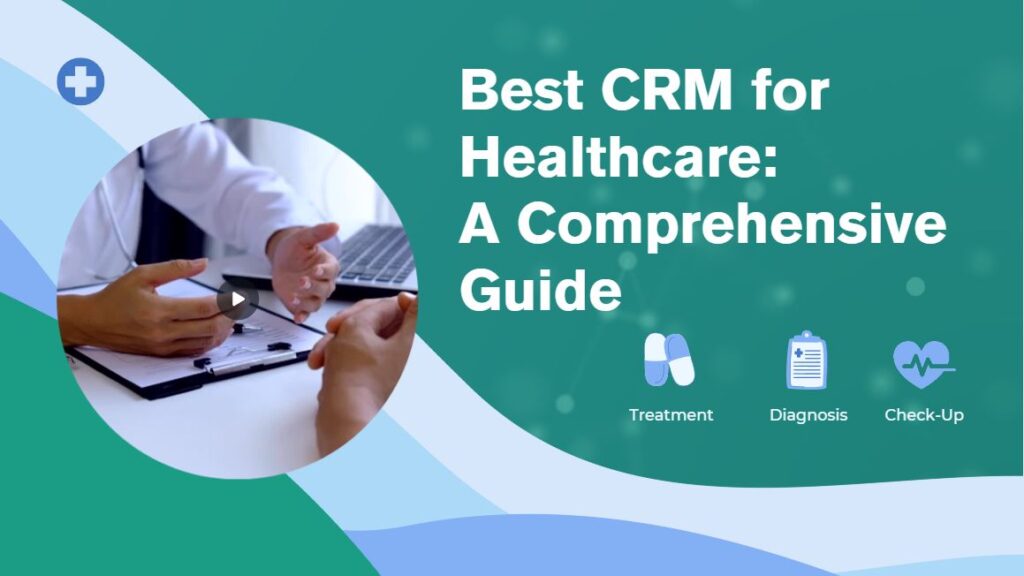Did you know that businesses using a CRM system experience a 29% increase in sales? This statistic is not just a testament to the power of CRM in sales-driven industries but also underscores its critical role in healthcare. As the healthcare sector continues to evolve, with increasing patient expectations and complex operational demands, the need for effective Customer Relationship Management (CRM) systems has never been greater.
This article aims to provide an in-depth comparison of the best CRM solutions tailored specifically for the healthcare industry. By evaluating various CRM platforms, we will help you identify the most suitable options that meet the unique demands of healthcare professionals and organizations.
Selecting the right CRM is pivotal for achieving success in healthcare. An effective CRM can enhance patient retention, streamline operations, improve communication, and ultimately lead to better patient outcomes. In a world where patient engagement and satisfaction are paramount, leveraging the right CRM is not just an option—it’s a necessity.
In this comprehensive guide, we will cover:
- The essential features to look for in a healthcare CRM
- A detailed review of the top CRM solutions available today
- Recommendations based on specific use cases
- A beginner’s buying guide to selecting the right CRM for your organization
What to Look for in a CRM for Your Business
Scalability
As healthcare organizations grow, their data and user demands will also increase. A scalable CRM can grow alongside your business, accommodating the rising number of patients, staff, and records. It’s essential to choose a CRM that can handle expanding operations without compromising performance.
Ease of Use
An intuitive interface is crucial, particularly for healthcare teams that may not be technologically savvy. A user-friendly CRM with a straightforward onboarding process will ensure that staff can quickly adapt to the system, minimizing disruptions to patient care and administrative workflows.
Customization
Every healthcare organization is unique, with specific workflows and requirements. The best CRM for healthcare should offer customizable features that allow you to tailor the system to your needs. This customization can include personalized dashboards, patient management tools, and reporting features that align with your business processes.
6 Best CRM Solutions for Healthcare
1. Salesforce CRM
Salesforce CRM is a leading cloud-based customer relationship management platform widely used across industries. It offers tailored solutions, including for healthcare, to streamline patient management, sales, and marketing activities.
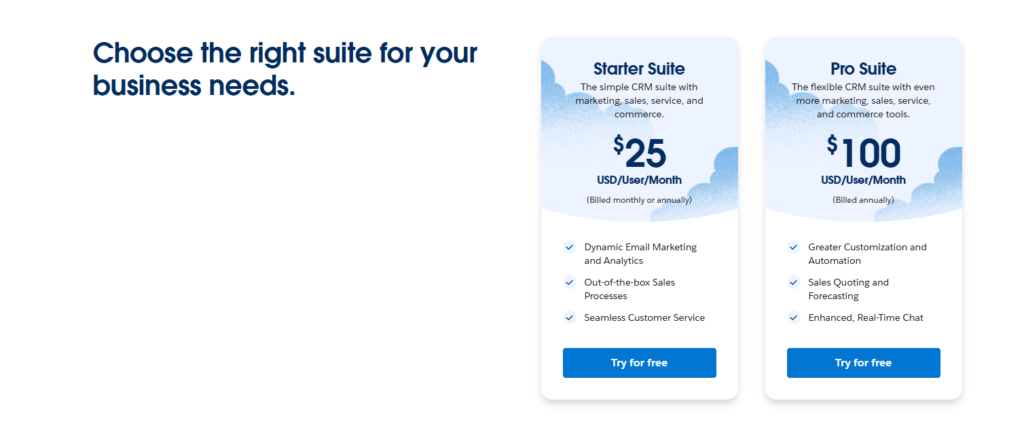
Key Features:
- Patient 360 View: Offers a comprehensive view of patients’ health records, interactions, and needs, helping healthcare providers deliver personalized care.
- Health Cloud: Specialized healthcare solution that integrates data from medical devices, wearables, and EMRs for better decision-making.
- HIPAA Compliance: Ensures secure management of patient data in line with regulatory requirements.
- Appointment Scheduling: Simplifies patient appointment setting and reminders.
- Collaborative Care: Enables care teams to coordinate effectively through real-time updates on patient conditions.
- AI-Powered Insights: Uses Salesforce Einstein to offer predictive insights, enhancing care quality and operational efficiency.
Salesforce CRM is ideal for large healthcare organizations, hospitals, and healthcare networks that need scalable solutions for patient management, cross-team collaboration, and data security compliance.
2. Zoho CRM
Zoho CRM is a flexible and cost-effective cloud-based solution that serves various industries, including healthcare. It helps manage patient relationships, appointments, and communications with customizable features tailored to small and mid-sized healthcare providers.
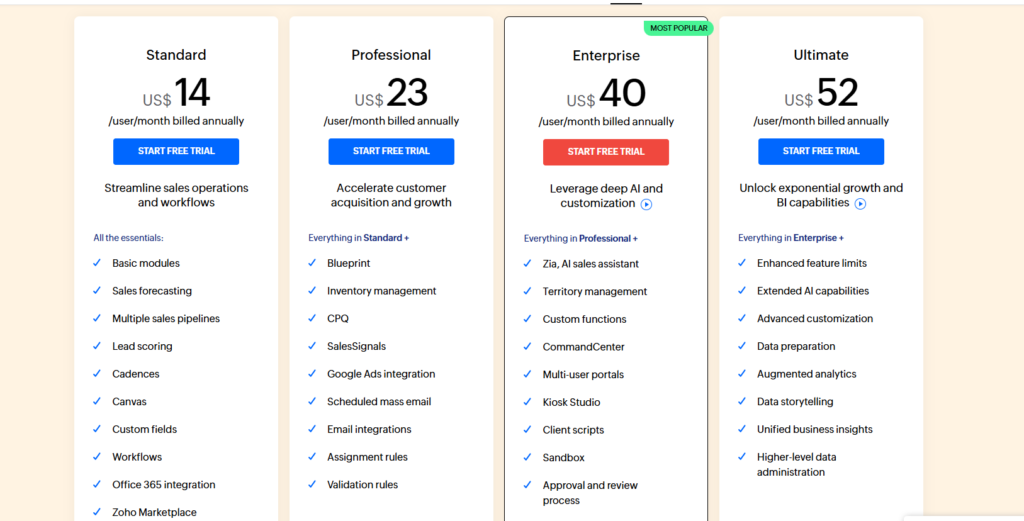
Key Features:
- Patient Management: Organize and track patient records, medical histories, and interactions in a single dashboard.
- Automation Tools: Automate tasks like appointment scheduling, follow-up reminders, and patient communication, improving workflow efficiency.
- HIPAA Compliance: Provides security features essential for healthcare data protection, ensuring compliance with regulations.
- Omnichannel Communication: Centralizes communication across email, phone, social media, and live chat, ensuring timely patient engagement.
- Analytics and Reporting: Offers in-depth insights into patient engagement and clinic operations to help healthcare providers optimize performance.
- AI-Powered Zia: Helps with predictive insights, lead scoring, and sentiment analysis, enhancing patient satisfaction.
Pricing:
- Standard: $14/user/month
- Professional: $23/user/month
- Enterprise: $40/user/month
- Ultimate: $52/user/month
(Custom pricing for healthcare-specific needs)
Zoho CRM is ideal for small to mid-sized healthcare providers, clinics, and individual practices looking for a customizable, cost-effective CRM to manage patient relationships, automate workflows, and maintain compliance with healthcare standards.
3. HubSpot CRM
HubSpot CRM is a user-friendly, scalable platform designed for small to medium-sized businesses but also effective in healthcare for managing patient interactions, marketing, and communications. It offers free core features and integrates marketing, sales, and service into one ecosystem.
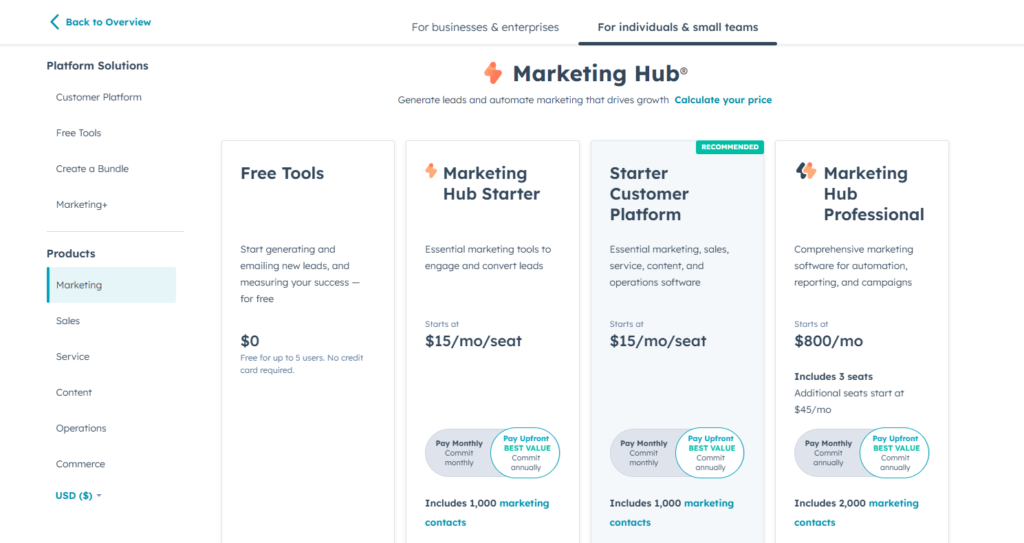
Key Features:
- Contact Management: Easily organize patient and client data, track interactions, and manage appointments, offering a clear view of each patient’s journey.
- Marketing Automation: Allows healthcare providers to send automated reminders, newsletters, and health updates, improving patient engagement.
- Email Tracking and Templates: Helps healthcare teams streamline patient outreach and follow-ups with customizable templates.
- Live Chat and Bots: Enables patient support via live chat or automated chatbots for faster resolution and triage of medical queries.
- Reporting Dashboards: Provides detailed analytics on patient interactions and communication effectiveness, enhancing operational decision-making.
- Integration with Healthcare Tools: Can integrate with other healthcare tools for seamless patient record management.
Pricing:
- Free Plan: $0 for core features.
- Starter: $15/month.
- Professional: $800/month.
- Enterprise: $3,600/month.
HubSpot CRM is well-suited for small to medium-sized healthcare providers, clinics, and private practices looking for an affordable yet robust CRM to manage patient communications, marketing, and engagement efficiently.
4. Microsoft Dynamics 365 CRM
Microsoft Dynamics 365 CRM is a powerful, integrated solution that combines customer relationship management and enterprise resource planning (ERP). It is widely used across industries, including healthcare, offering comprehensive tools for patient management, operational efficiency, and regulatory compliance.
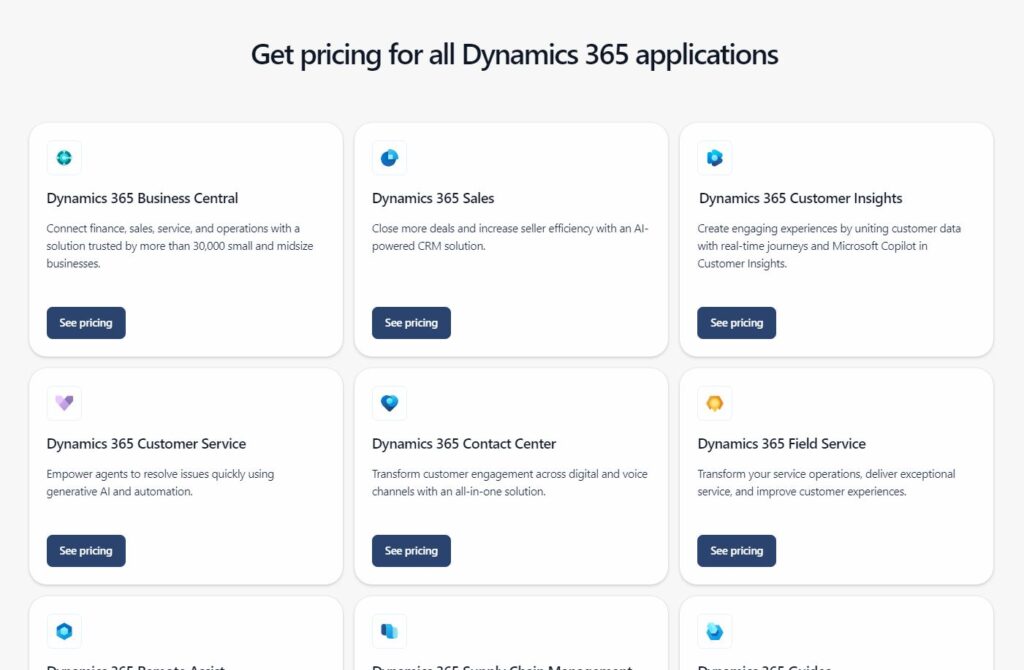
Key Features:
- Healthcare Accelerator: Provides pre-built healthcare templates and workflows, including patient management, care coordination, and appointment scheduling.
- Patient Engagement: Centralizes patient information and history, providing a 360-degree view for personalized care and improved patient outcomes.
- AI & Predictive Analytics: Leverages AI to provide insights into patient data, predict health trends, and optimize treatment plans.
- Integration with Microsoft Tools: Seamless integration with Microsoft Office, Teams, and Azure enables healthcare providers to collaborate and share data securely.
- HIPAA Compliance: Ensures compliance with healthcare regulations, securing sensitive patient information.
- Care Coordination: Facilitates collaboration among care teams, improving the quality of patient care.
Microsoft Dynamics 365 CRM is ideal for large healthcare organizations, hospitals, and multi-location healthcare providers needing advanced data integration, AI-powered insights, and secure collaboration for improved patient outcomes and operational efficiency.
5. Freshsales
Freshsales is a part of the Freshworks suite, offering an intuitive and easy-to-use CRM solution with built-in AI, automation, and customizable features. It’s designed to help businesses of all sizes, including healthcare providers, manage patient relationships, sales, and communication effectively.
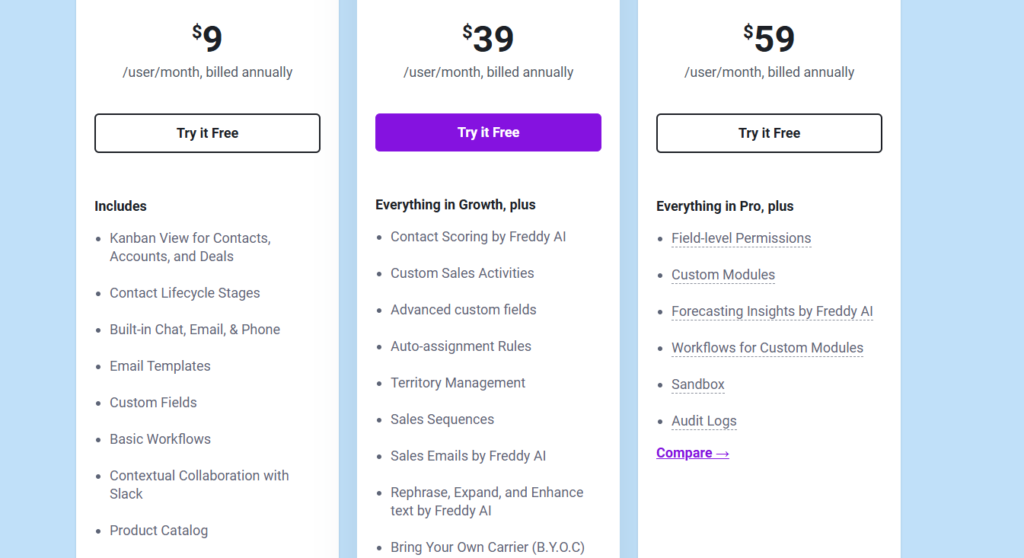
Key Features:
- Patient 360 View: Provides a comprehensive view of patient profiles, medical history, and interactions, ensuring personalized care.
- Workflow Automation: Automates repetitive tasks such as appointment scheduling, follow-up reminders, and communication, improving healthcare provider efficiency.
- AI-Powered Freddy: Helps with predictive analytics and patient engagement insights, optimizing care delivery and patient outcomes.
- Appointment and Task Management: Streamlines appointment scheduling, task assignments, and patient follow-ups, keeping healthcare operations organized.
- Omnichannel Communication: Centralizes communication across email, chat, phone, and SMS, allowing healthcare teams to stay connected with patients.
- Customizable Dashboards: Offers real-time insights and reporting on patient interactions, helping clinics and hospitals monitor performance and engagement.
Freshsales is ideal for small to mid-sized healthcare providers, clinics, and private practices looking for an affordable, easy-to-use CRM solution to manage patient engagement, streamline communication, and automate routine tasks for better operational efficiency.
6. Pipedrive CRM
Pipedrive CRM is a sales-focused platform designed to help businesses manage leads, deals, and customer interactions. While its core focus is on sales pipelines, it can be adapted for healthcare providers to track patient interactions, streamline communication, and improve care coordination.
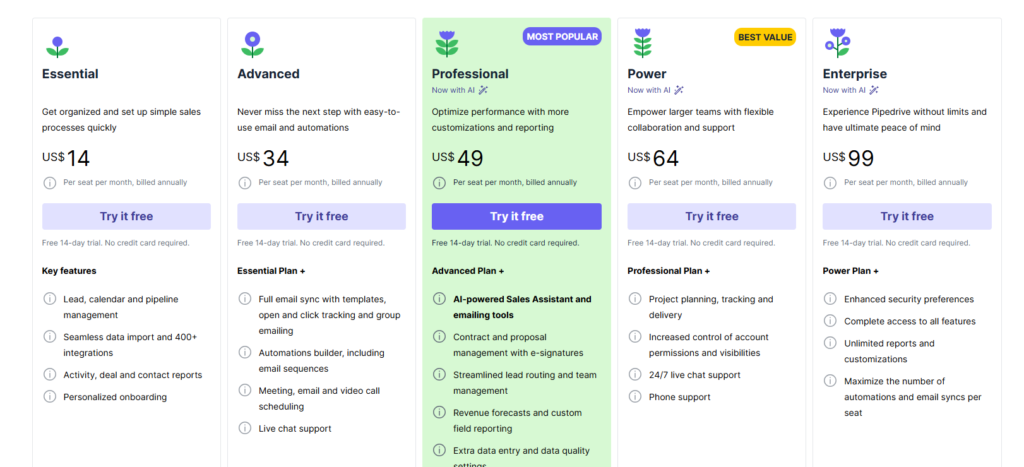
Key Features:
- Pipeline Management: Allows healthcare providers to track patient journeys, from initial appointments to follow-up care, ensuring no step is missed.
- Customizable Fields: Adaptable to healthcare needs, enabling the addition of custom fields for patient information, medical history, or appointment tracking.
- Automation: Automates repetitive tasks like patient follow-ups and appointment reminders, saving time and enhancing patient engagement.
- Email Integration: Centralizes communication with patients, keeping all emails and interactions in one place for better coordination.
- Reporting and Insights: Provides detailed reports on patient interactions, appointment schedules, and clinic performance, aiding decision-making.
- Mobile App: Ensures healthcare teams can access patient data and manage appointments on the go.
Pipedrive is best suited for small to medium-sized healthcare practices that require an affordable, easy-to-use CRM to manage patient appointments, track interactions, and improve communication while maintaining an organized workflow.
Which CRM is Best for Your Healthcare Organization?
After evaluating various CRM solutions, Salesforce Health Cloud emerges as the top choice for healthcare organizations. Its robust features, scalability, and strong integration capabilities make it well-suited for the diverse needs of the healthcare industry. However, organizations with tighter budgets may find Zoho CRM to be a compelling alternative, offering essential features at a lower price point.
Use Case Recommendations
- For Large Hospitals: Salesforce Health Cloud is ideal due to its extensive capabilities and customization options.
- For Small Practices: Zoho CRM offers a cost-effective solution with essential features for smaller teams.
- For Telehealth Services: NexHealth provides features tailored to remote patient engagement, making it a strong choice for telehealth providers.
- For Research Institutions: Microsoft Dynamics 365 offers robust reporting and analytics tools suitable for research-oriented organizations.
Now that you have a better understanding of the best CRM solutions for healthcare, consider taking actionable steps:
- Start a free trial with the recommended CRM providers.
- Schedule a demo to see how these solutions can fit into your organization.
How to Choose a CRM: A Beginner’s Buying Guide for Healthcare
Step-by-Step Guidance
- Identify Your Business Needs: Assess the specific challenges your organization faces and the features that would best address them.
- Evaluate Features: Look for essential CRM features such as patient management, communication tools, reporting capabilities, and integration options.
- Consider Budget Constraints: Determine your budget for a CRM solution and explore options that fit within your financial parameters.
- Assess Customer Support: Choose a CRM provider known for excellent customer service, as ongoing support will be crucial for successful implementation.
Conclusion
In conclusion, selecting the right CRM is vital for the success of healthcare organizations. The best CRM for healthcare not only improves patient engagement but also streamlines operations, making it easier for healthcare providers to deliver high-quality care.
As you navigate the CRM selection process, consider your long-term business goals and the scalability of the solution. The right CRM can significantly impact your organization’s ability to adapt and thrive in an ever-changing healthcare landscape.
Explore and compare the CRM solutions mentioned above to find the best fit for your organization. Consider starting a free trial or scheduling a demo to experience firsthand how these tools can enhance your patient care and operational efficiency.
FAQs
1. Do I really need a CRM?
Yes, a CRM can help streamline patient management, improve communication, and enhance overall operational efficiency.
2. How secure is my data in a CRM?
Most CRM providers implement robust security measures, including data encryption and compliance with industry regulations, to protect sensitive information.
3. Can a CRM integrate with my existing tools?
Many CRMs offer integration capabilities with popular healthcare software and tools, ensuring a seamless workflow.
4. What is the cost of implementing a CRM system?
The cost varies depending on the provider and features chosen, but many offer tiered pricing structures to accommodate different budgets.
5. How long does it take to set up a CRM?
The setup time can vary based on the complexity of the system and the size of your organization. Generally, it can take anywhere from a few weeks to several months.
By following this detailed guide, you’ll be well-equipped to make an informed decision about the best CRM for healthcare, ensuring your organization can thrive in today’s competitive landscape.
A seasoned professional specializing in CRM, SEO, and Social Media Marketing (SMM). With a deep understanding of customer relationship management, I help businesses optimize their digital strategies to enhance customer engagement and drive growth. Passionate about delivering measurable results through data-driven techniques and effective marketing solutions.
Let me know if you’d like any adjustments!

